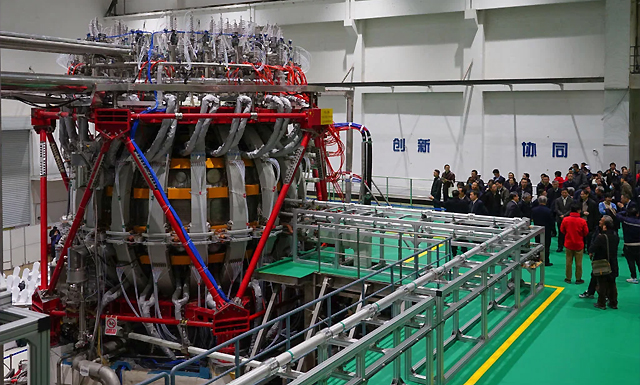‘Tokamak’ can reach temperature of more than 150 million degrees Celsius; that’s 10 times hotter than the core of the Sun.
According to China’s state-run People’s Daily, the emerging global power nested in the Tropic of Cancer zone, has successfully activated its so-called “artificial sun,” a nuclear fusion reactor that could fuel its energy ambitions for years to come — if they can make it more sustainable.
China’s Atomic Energy Authority fired up its HL-2M Tokamak reactor for the first time on Friday, the state-controlled media reported. The brief test is being hailed as an important scientific achievement amid a global effort to develop safer, cleaner forms of nuclear energy.
“The development of nuclear fusion energy is not only a way to solve China’s strategic energy needs, but also has great significance for the future sustainable development of China’s energy and national economy,” a report says.
China has been working alongside the International Thermonuclear Experimental Reactor (ITER) project, a coalition of dozens of nuclear-powered nations. Their aim is to develop a reliable form of nuclear fusion based on the same concept.
ITER is said to be working on its own reactor in France, which is expected to be completed in 2025.
ALSO READ:
Pakistan Gate Crashes Into Pressurized Water Nuclear Reactors
Pakistan Focuses on Peaceful Use of Nuke Technology
Pakistan Using ‘Nuclear Knowledge’ For Sustainable Development Goals
Asked to comment on the report, a Pakistan-based China observer, says, “China is at the cusp of many technological breakthroughs, specially in the fields of Artificial Intelligence, Quantum Computing, Space exploration, renewable energy, Electric vehicles, etc. “These are all vectors of future world”, according to him.
“We can benefit from these technologies provided we invest in infrastructure and human resource capable enough to absorb these,” he adds.
According to him, Pakistan and rest of other countries’ civilian nuclear field have benefited from their nuclear weapon’s programs, and “same incubation may not be available for these fields (in Pakistan) as these require governmental focus and investment”, he says.
In his view, “China has become a gold mine waiting to be harnessed”. That’s likely true for other countries in Asia also, says another observer.
“The key to all these is capability building followed by capacity building in partnerships”, says an academia.
ALSO READ: The Great Pyramids and Wireless Electric Energy
“Establishing islands of excellence may be relatively straight-forward and can be executed by designing and implementing plans, however, expanding scientific thinking across society is as much cultural as it is engineering”, says an Asia-Pacific China observer and author of several books on US-China relations and South Asia.
According to him, “building islands of excellence requires a dedicated community of scientists supported by state funding and policy-sponsorship”. “This is feasible for most well-organized states. However, expanding islands of excellence into a societal category requires revolutionary shifts in collective belief in practice,” he says.
The Asia-Pacific based observer points out that Europe took almost three centuries of transformative changes after protracted religious warfare to shift collectively from blind belief to a culture of inquiry founded on skepticism. “There are few signs of that happening in South Asia”, he says.
ALSO READ: Ancient Civilization Was ‘Globally Connected’ (Video)
Last week, with China’s high-tech assistance, Pakistan inched forward toward peaceful use of nuclear technologies. The country has successfully begun the process of fuel loading at the 1100 MW K2 unit in the Karachi Nuclear Power Plant (KANUPP). If all goes well, three more reactors will be commissioned in Karachi (in Sindh) and one at Chashma (in Punjab).
The fact that this plant is jointly fabricated by China and Pakistan indicates high technological standards the country has achieved in peaceful use of nuclear technologies –“with China’s help”, an observer says.
“Still, a made in Pakistan ‘Tokamak’ with or without China help (both countries call each other ‘Iron brothers’) or such a thing in any other South Asian countries is a pipe dream”, says the Pakistani academia.








